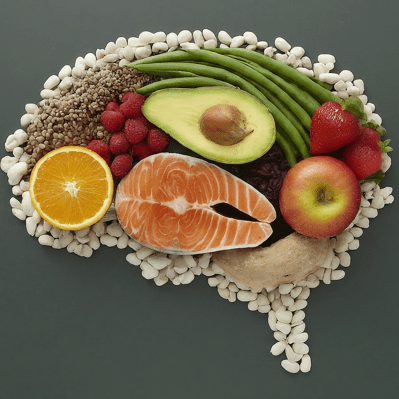
Alzheimer’s disease, a relentless neurodegenerative condition, impacts millions globally. While there’s no cure, ongoing research suggests that diet can be a powerful tool in reducing the risk of developing this disease. Recent research suggests that by choosing specific foods and adhering to particular dietary patterns, you can promote brain health and potentially decrease the likelihood of cognitive decline.
If you or a loved one is dealing with Alzheimer’s disease or dementia and requires assistance with daily activities such as cooking, cleaning, medication management, and companionship, Homewatch CareGivers of St Charles is here to assist. For more details on our services, please visit our website or call us directly at 630-407-1379.
The Mediterranean Diet
Known for its benefits to heart health, the Mediterranean diet is also emerging as a protector of brain health. This diet emphasizes the consumption of whole foods, including fruits, vegetables, whole grains, nuts, seeds, and healthy fats primarily sourced from olive oil. Omega-3-rich fish like salmon and mackerel are also integral components.
A recent study in Frontiers in Neuroscience from 2023 revealed that following the Mediterranean diet is linked with a reduced risk of Alzheimer’s and slower cognitive decline. The diet’s anti-inflammatory focus and healthy fats are believed to play a crucial role in shielding the brain from oxidative stress and inflammation, which are key factors in neurodegeneration.
Discover more about the Mediterranean diet.
The DASH Diet
Originally designed to combat high blood pressure, the DASH diet is also beneficial for brain health. This dietary approach prioritizes fruits, vegetables, whole grains, lean proteins, and low-fat dairy, while restricting saturated fats, sodium, and sugars.
A 2023 study in Neurology suggests that the DASH diet may lower the risk of Alzheimer’s by promoting cardiovascular health, which is closely connected to brain function. Maintaining optimal blood pressure and cholesterol levels is vital, as cardiovascular issues are significant risk factors for cognitive decline.
Learn more about the DASH diet.
The MIND Diet
The MIND diet, or Mediterranean-DASH Intervention for Neurodegenerative Delay, is a blend of the Mediterranean and DASH diets specifically formulated to decrease the risk of Alzheimer’s. This diet emphasizes ten brain-boosting food groups: leafy green vegetables, other vegetables, nuts, berries (especially blueberries), beans, whole grains, fish, poultry, olive oil, and moderate wine intake.
Research from the T.H. Chan School of Public Health at Harvard University indicates that strict adherence to the MIND diet could lower the risk of Alzheimer’s by up to 53%. The diet also recommends limiting red meat, butter, cheese, sweets, and fried foods, all of which are associated with cognitive decline.
Explore the benefits of the MIND diet.
Foods Packed with Antioxidants
Antioxidants are vital for protecting the brain from oxidative stress, a leading contributor to Alzheimer’s disease. Incorporating antioxidant-rich foods like berries, dark leafy greens, and nuts into your diet is essential for maintaining cognitive health.
Berries, particularly blueberries, are abundant in flavonoids, which have been shown to enhance brain function and slow cognitive decline, according to a 2021 article in Neurology. Leafy greens like spinach and kale are loaded with vitamins and minerals that bolster brain health. Nuts, especially walnuts, offer healthy fats and antioxidants that are beneficial for cognitive performance.
Find out more about the role of flavonoids in brain health.
Omega-3 Fatty Acids
Omega-3 fatty acids are critical for maintaining brain health and are found in fatty fish like salmon, mackerel, and sardines, as well as in flaxseeds, chia seeds, and walnuts. These fats have anti-inflammatory properties and are known to enhance brain function, memory, and mood.
Research published in Prostaglandins Leukot Essent Fatty Acids shows that higher consumption of omega-3 fatty acids is linked to a reduced risk of Alzheimer’s. Including these healthy fats in your diet can help protect your brain and potentially reduce the risk of cognitive decline.
Learn more about Omega-3s and cognitive health.
While no diet can completely prevent Alzheimer’s, adopting a diet rich in brain-healthy foods can significantly reduce your risk. The Mediterranean, DASH, and MIND diets, all abundant in whole foods, healthy fats, and antioxidants, are highly effective in supporting cognitive health. By adding antioxidant-rich foods and omega-3 fatty acids to your diet, you can take proactive steps to defend your brain against aging and inflammation, possibly lowering your risk of Alzheimer’s disease.
At Homewatch CareGivers of St Charles, our dedicated caregivers assist clients in preparing nutritious meals that align with these dietary guidelines. Whether you need help for just an hour a week, around the clock, or anything in between, we’re here to help you or your loved one maintain a healthy, independent lifestyle. To learn more about our services, please visit our website or call us at 630-407-1379 today!
---
References:
- Xu Lou I, Ali K and Chen Q, (2023)“Effect of nutrition in Alzheimer’s disease: A systematic review.” Frontiers in Neuroscience. 17:1147177. doi: 10.3389/fnins.2023.11471772.
- Puja Agarwal, Sue E. Leurgans, Sonal Agrawal, Neelum T. Aggarwal, Laurel J. Cherian, Bryan D. James, Klodian Dhana, Lisa L. Barnes, David A. Bennett, and Julie A. Schneider, (2023) "Association of Mediterranean-DASH Intervention for Neurodegenerative Delay and Mediterranean Diets With Alzheimer Disease Pathology." Neurology. 100 (22) https://doi.org/10.1212/WNL.000000000020717
- 3. Harvard T. H. Chan School of Public Health, (2023) “Diet Review: MIND Diet.” The Nutrition Source. https://nutritionsource.hsph.harvard.edu/healthy-weight/diet-reviews/mind-diet/
- 4. Tian-Shin Yeh, Changzheng Yuan, Alberto Ascherio, Bernard A. Rosner, Walter C. Willett, and Deborah Blacker. (2021) “Long-term Dietary Flavonoid Intake and Subjective Cognitive Decline in US Men and Women.” Neurology. 97 (10) https://doi.org/10.1212/WNL.0000000000012454
- 5. Cole GM, Ma QL, Frautschy SA. (2009)“Omega-3 fatty acids and dementia.” Prostaglandins Leukot Essent Fatty Acids. 81(2-3):213-21. doi: 10.1016

